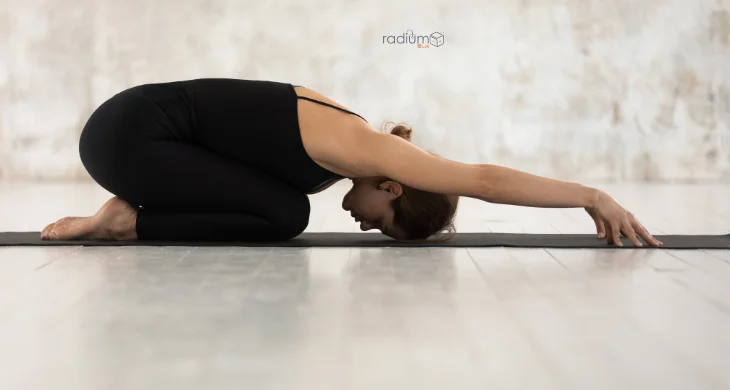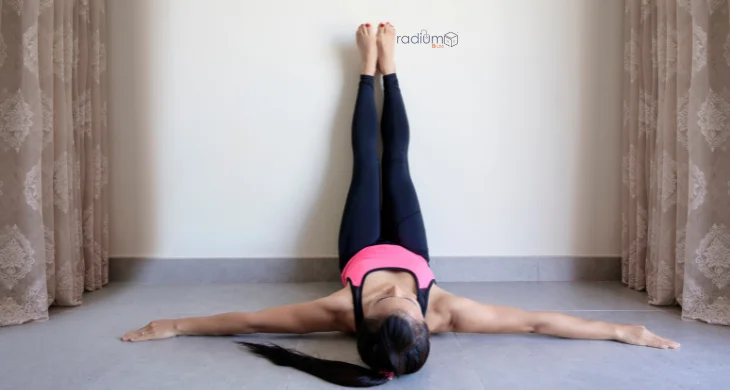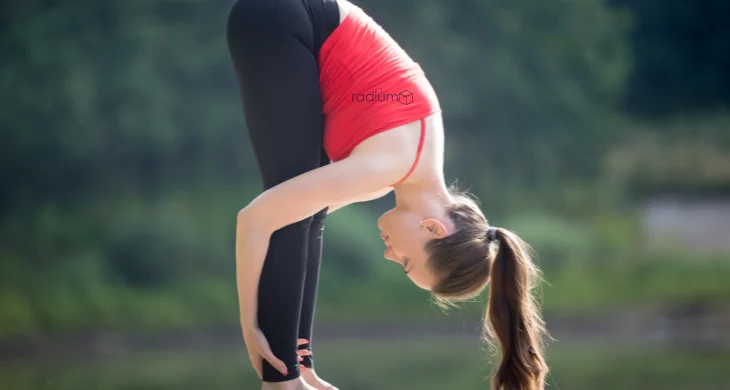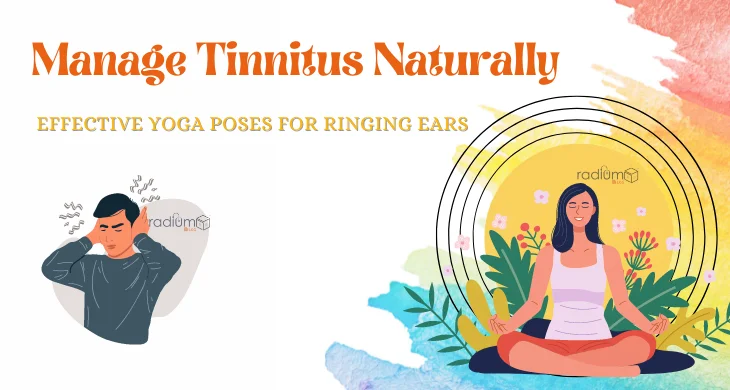In our busy lifestyles, lots of people encounter health challenges like tinnitus, which involves hearing persistent sounds like ringing or buzzing in the ears. These noises can be bothersome and upsetting, affecting daily life and mental peace. While there’s no outright cure for tinnitus, there are ways to ease its symptoms and improve general wellness, and yoga is one such avenue. Yoga, with its gentle exercises and focus on relaxation and mindfulness, has shown promise in helping individuals manage tinnitus better. By incorporating yoga into their routine, people experiencing tinnitus can potentially find relief from the discomfort and distress caused by this condition, while also enhancing their overall quality of life.
What is Tinnitus?
Tinnitus is a prevalent condition characterized by the perception of sounds, such as ringing, buzzing, hissing, or roaring, in the ears or head without any external source. These sounds can manifest in various pitches and volumes, ranging from mild to severe, and may present themselves intermittently or persistently. Individuals experiencing tinnitus often describe it as bothersome or distracting, affecting their overall quality of life and mental well-being.
While tinnitus itself is not a disease, it can be a symptom of an underlying health issue, such as hearing loss, ear infections, or circulatory problems. Additionally, exposure to loud noises, stress, certain medications, and other factors can exacerbate tinnitus symptoms.
Managing tinnitus can be challenging, as there is no one-size-fits-all solution. However, various coping strategies and treatments, such as sound therapy, relaxation techniques, counseling, and in some cases, medication, may help alleviate symptoms and improve quality of life for individuals living with tinnitus. Seeking support from healthcare professionals and exploring different management options can empower individuals to better cope with and mitigate the impact of tinnitus on their daily lives.
What is Tinnitus caused by?
Tinnitus can result from a range of factors, such as being around loud noises for extended periods, getting older and experiencing age-related hearing decline, having too much earwax blocking the ear canal, dealing with ear infections, taking certain medications, or having health issues like high blood pressure or problems with the temporomandibular joint (TMJ). Although the precise cause of tinnitus isn’t always obvious, it’s often linked to things like hearing loss, exposure to loud sounds, ear problems, or underlying medical conditions. Sometimes, tinnitus can occur without any apparent reason, making it a perplexing and frustrating condition for those who experience it. Understanding the potential causes can help individuals better manage and address their tinnitus symptoms.
Exploring Yoga for Relief
Yoga is an ancient practice that combines physical postures, breathing exercises, and meditation to promote holistic health and well-being. When it comes to managing tinnitus, certain yoga poses can help alleviate symptoms and provide relief. Let’s explore some of these poses:
- Child’s Pose (Balasana): This soothing yoga pose involves kneeling on the floor, then bending forward to rest the forehead on the ground while reaching the arms forward or by the sides. It gently stretches the spine, hips, and thighs, while also releasing tension in the neck and shoulders. By allowing the body to surrender to gravity, Child’s Pose promotes relaxation and helps calm the mind. It’s especially beneficial for relieving stress and fatigue, making it a great choice for those experiencing tinnitus-related discomfort in the head and neck area.

- Cat-Cow Pose (Marjaryasana-Bitilasana): Cat-Cow Pose involves alternating between arching and rounding the spine, creating a gentle, flowing movement. This rhythmic motion helps improve flexibility and circulation in the spine, which can alleviate tension and stiffness in the neck and shoulders. By encouraging blood flow to the ears, Cat-Cow Pose may also help reduce the perception of tinnitus symptoms. Additionally, the focused breathing and mindful movement in this pose can promote relaxation and stress relief, making it an effective practice for managing tinnitus-related discomfort.

- Legs Up the Wall (Viparita Karani): Legs Up the Wall is a restorative yoga pose that involves lying on the back with the legs extended vertically up the wall. This gentle inversion allows gravity to assist in improving blood flow throughout the body, including the head and ears. By reducing pressure and congestion in the head, Legs Up the Wall may help alleviate tinnitus symptoms and promote a sense of relaxation and ease. This pose also encourages deep breathing and relaxation, making it an excellent choice for calming the mind and body after a stressful day.

- Forward Fold (Uttanasana): Forward Fold is a standing yoga pose that involves bending forward from the hips and reaching towards the ground with the hands. This pose stretches the spine, hamstrings, and calves, while also releasing tension in the neck and shoulders. By encouraging blood flow to the head and ears, Forward Fold may help reduce the intensity of tinnitus symptoms and promote a sense of relaxation and well-being. Practising this pose regularly can also improve flexibility and mobility in the spine and lower body, supporting overall physical health and vitality.

- Corpse Pose (Savasana): Corpse Pose is a relaxation posture that involves lying on the back with the arms and legs extended comfortably, palms facing up. This pose allows the body and mind to fully relax and unwind, promoting deep relaxation and stress relief. By releasing tension in the muscles and calming the nervous system, Corpse Pose can help alleviate the physical and mental discomfort associated with tinnitus. Practising Savasana regularly can also improve sleep quality and promote a sense of inner peace and tranquillity, making it an essential part of any yoga practice for tinnitus relief.

- Neck Stretches: Gentle neck stretches, such as tilting the head from side to side and gently rolling the neck in circles, can help relieve tension and stiffness in the neck and shoulders. These simple movements promote flexibility and range of motion in the neck, while also encouraging relaxation and stress relief. By releasing tension in the muscles surrounding the head and ears, neck stretches may help alleviate tinnitus symptoms and promote a sense of well-being. Incorporating these gentle stretches into your daily routine can provide relief from discomfort and support overall neck and shoulder health.

Soft Shoulder Roll: Rolling the shoulders gently forward and backwards can help release tension in the shoulders and upper back, promoting relaxation and ease. This simple movement encourages circulation and mobility in the shoulder joints, while also relieving stiffness and discomfort. By reducing tension in the muscles surrounding the head and neck, soft shoulder rolls may help alleviate tinnitus symptoms and promote a sense of calm and well-being. Practising this gentle movement regularly can support overall shoulder health and enhance relaxation in the upper body.

Conclusion
While tinnitus can be a challenging condition to manage, incorporating yoga into your daily routine can offer relief and support your overall well-being. By practicing these gentle yoga poses regularly and adopting a mindful approach to managing stress, you can find relief from ringing ears and enjoy greater peace and tranquillity in your life. Always consult with a healthcare professional before starting any new exercise regimen, especially if you have underlying health conditions.
Frequently Asked Questions
Que: Is tinnitus curable?
Ans: There is currently no known cure for tinnitus, but various treatments and management strategies can help alleviate symptoms and improve quality of life for individuals affected by the condition.
Que: Can stress make tinnitus worse?
Ans: Yes, stress and anxiety can exacerbate tinnitus symptoms. Learning stress management techniques and adopting relaxation practices may help reduce the severity of tinnitus.
Que: Are there lifestyle changes that can help manage tinnitus?
Ans: Yes, adopting a healthy lifestyle that includes regular exercise, a balanced diet, adequate sleep, and minimizing exposure to loud noises can help manage tinnitus symptoms.
Que: When should I see a doctor about my tinnitus?
Ans: If you experience persistent or bothersome tinnitus, it’s advisable to consult a healthcare professional, particularly if it interferes with your daily activities or is accompanied by other symptoms such as dizziness, hearing loss, or ear pain.
Que: How do neck stretches and soft shoulder rolls contribute to tinnitus relief?
Ans: Gentle neck stretches and soft shoulder rolls help release tension in the muscles surrounding the head and ears, promoting relaxation and easing discomfort associated with tinnitus.




